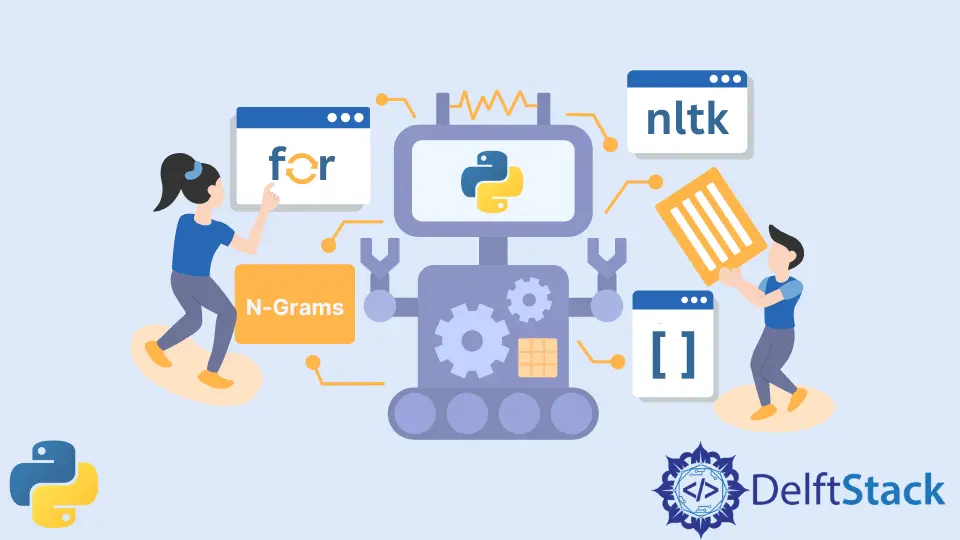Crear N-Grams a partir de texto en Python
-
Use el bucle
forpara crear N-Grams a partir de texto en Python -
Use
nltkpara crear N-Grams a partir de texto en Python

En lingüística computacional, los n-gramas son importantes para el procesamiento del lenguaje y el análisis contextual y semántico. Son secuencias continuas y consecutivas de palabras adyacentes entre sí de una cadena de tokens.
Los populares son unigramas, bigramas y trigramas, y son efectivos, y donde n>3, puede haber escasez de datos.
Este artículo discutirá cómo crear n-gramas en Python usando funciones y bibliotecas.
Use el bucle for para crear N-Grams a partir de texto en Python
Podemos crear efectivamente una función ngramas que toma el texto y el valor n, que devuelve una lista que contiene los n-gramas.
Para crear la función, podemos dividir el texto y crear una lista vacía (salida) que almacenará los n-gramas. Usamos el bucle for para recorrer la lista splitInput para recorrer todos los elementos.
Las palabras (tokens) luego se agregan a la lista de salida.
def ngrams(input, num):
splitInput = input.split(" ")
output = []
for i in range(len(splitInput) - num + 1):
output.append(splitInput[i : i + num])
return output
text = "Welcome to the abode, and more importantly, our in-house exceptional cooking service which is close to the Burj Khalifa"
print(ngrams(text, 3))
La salida del código
[['Welcome', 'to', 'the'], ['to', 'the', 'abode,'], ['the', 'abode,', 'and'], ['abode,', 'and', 'more'], ['and', 'more', 'importantly,'], ['more', 'importantly,', 'our'], ['importantly,', 'our', 'in-house'], ['our', 'in-house', 'exceptional'], ['in-house', 'exceptional', 'cooking'], ['exceptional', 'cooking', 'service'], ['cooking', 'service', 'which'], ['service', 'which', 'is'], ['which', 'is', 'close'], ['is', 'close', 'to'], ['close', 'to', 'the'], ['to', 'the', 'Burj'], ['the', 'Burj', 'Khalifa']]
Use nltk para crear N-Grams a partir de texto en Python
La biblioteca NLTK es un conjunto de herramientas de lenguaje natural que proporciona una interfaz fácil de usar para recursos importantes para el procesamiento de texto y tokenización, entre otros. Para instalar nltk, podemos usar el comando pip a continuación.
pip install nltk
Para mostrarnos un problema potencial, usemos el método word_tokenize(), que nos ayuda a crear una copia tokenizada del texto que le pasamos usando el tokenizador de palabras recomendado por NLTK antes de pasar a escribir un código más detallado.
import nltk
text = "well the money has finally come"
tokens = nltk.word_tokenize(text)
La salida del código:
Traceback (most recent call last):
File "c:\Users\akinl\Documents\Python\SFTP\n-gram-two.py", line 4, in <module>
tokens = nltk.word_tokenize(text)
File "C:\Python310\lib\site-packages\nltk\tokenize\__init__.py", line 129, in word_tokenize
sentences = [text] if preserve_line else sent_tokenize(text, language)
File "C:\Python310\lib\site-packages\nltk\tokenize\__init__.py", line 106, in sent_tokenize
tokenizer = load(f"tokenizers/punkt/{language}.pickle")
File "C:\Python310\lib\site-packages\nltk\data.py", line 750, in load
opened_resource = _open(resource_url)
File "C:\Python310\lib\site-packages\nltk\data.py", line 876, in _open
return find(path_, path + [""]).open()
File "C:\Python310\lib\site-packages\nltk\data.py", line 583, in find
raise LookupError(resource_not_found)
LookupError:
**********************************************************************
Resource [93mpunkt[0m not found.
Please use the NLTK Downloader to obtain the resource:
[31m>>> import nltk
>>> nltk.download('punkt')
[0m
For more information see: https://www.nltk.org/data.html
Attempted to load [93mtokenizers/punkt/english.pickle[0m
Searched in:
- 'C:\\Users\\akinl/nltk_data'
- 'C:\\Python310\\nltk_data'
- 'C:\\Python310\\share\\nltk_data'
- 'C:\\Python310\\lib\\nltk_data'
- 'C:\\Users\\akinl\\AppData\\Roaming\\nltk_data'
- 'C:\\nltk_data'
- 'D:\\nltk_data'
- 'E:\\nltk_data'
- ''
**********************************************************************
El motivo del mensaje de error anterior y el problema es que la biblioteca NLTK requiere ciertos datos para algunos métodos, y no hemos descargado los datos, especialmente si es la primera vez que los usa. Por lo tanto, necesitamos el descargador NLTK para descargar dos módulos de datos, punkt y averaged_perceptron_tagger.
Los datos están disponibles para su uso, por ejemplo, cuando se utilizan métodos como words(). Para descargar los datos, necesitamos el método download() si necesitamos ejecutarlo a través de nuestro script de Python.
Puede crear un archivo de Python y ejecutar el siguiente código para resolver el problema.
import nltk
nltk.download("punkt")
nltk.download("averaged_perceptron_tagger")
O ejecute los siguientes comandos a través de su interfaz de línea de comandos:
python -m nltk.downloader punkt
python -m nltk.downloader averaged_perceptron_tagger
Código de ejemplo:
import nltk
text = "well the money has finally come"
tokens = nltk.word_tokenize(text)
textBigGrams = nltk.bigrams(tokens)
textTriGrams = nltk.trigrams(tokens)
print(list(textBigGrams), list(textTriGrams))
La salida del código:
[('well', 'the'), ('the', 'money'), ('money', 'has'), ('has', 'finally'), ('finally', 'come')] [('well', 'the', 'money'), ('the', 'money', 'has'), ('money', 'has', 'finally'), ('has', 'finally', 'come')]
Código de ejemplo:
import nltk
text = "well the money has finally come"
tokens = nltk.word_tokenize(text)
textBigGrams = nltk.bigrams(tokens)
textTriGrams = nltk.trigrams(tokens)
print("The Bigrams of the Text are")
print(*map(" ".join, textBigGrams), sep=", ")
print("The Trigrams of the Text are")
print(*map(" ".join, textTriGrams), sep=", ")
La salida del código:
The Bigrams of the Text are
well the, the money, money has, has finally, finally come
The Trigrams of the Text are
well the money, the money has, money has finally, has finally come
Olorunfemi is a lover of technology and computers. In addition, I write technology and coding content for developers and hobbyists. When not working, I learn to design, among other things.
LinkedIn